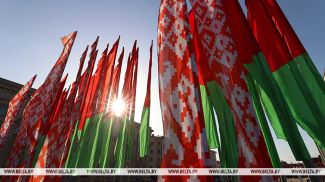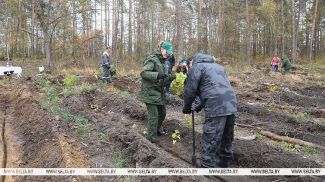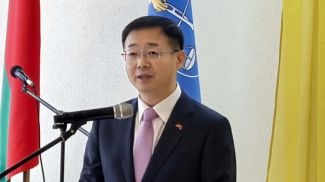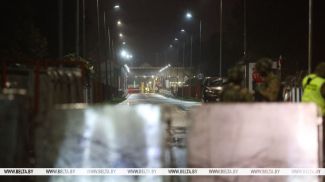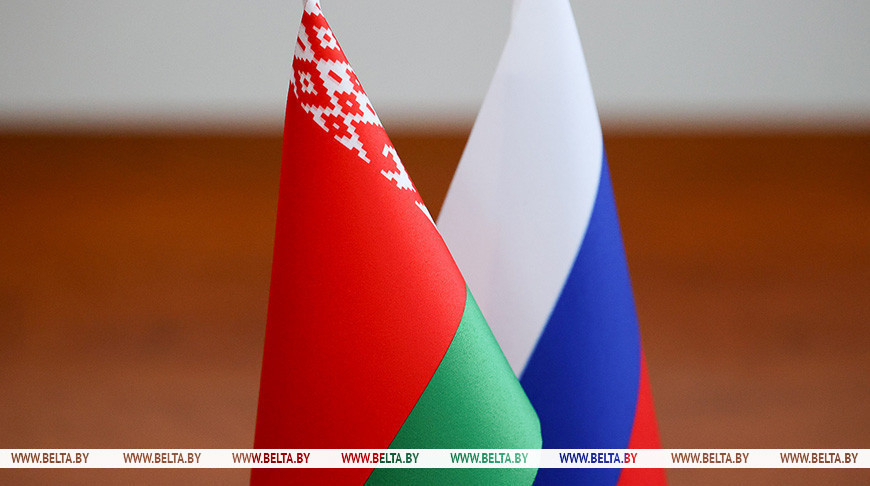
MOSCOW, 16 December (BelTA) – The Union State of Belarus and Russia demonstrates impressive results despite the economic pressure from the West. Head of the Office of Belarus’ Council of Ministers Konstantin Burak made the statement during the conference “Union State: Integration, development, trust” held in Moscow and dedicated to the 25th anniversary of the signing of the Union State Foundation Treaty, BelTA has learned.
Konstantin Burak said: “For a quarter of the century we’ve made sure of the correctness of the joint policy we have chosen. Integration has allowed our brotherly nations to overcome destructive centrifugal tendencies in economy and social sphere, transition to the construction of a union home on the basis of historical, spiritual, and cultural commonality and the mutually complementary nature of the economies. It is logical that we approaching an anniversary with a good economic basis.”
He mentioned some statistics. Since 1999 Belarus’ GDP has increased by more than six times, with Russia’s GDP up by ten times. Belarus’ GDP per capita has increased by nearly seven times, with Russia’s GDP per capita up by 11 times. Since 1999 the volume of mutual trade in goods and services has risen by seven times and has reached $58 billion. “If the current growth rate remains in place, this year the trade volume may exceed $60 billion,” the head of the Office of the Council of Ministers projected.
“Belarus and Russia demonstrate impressive development results despite attempts of the West to choke us with economic tools. Contrary to designs of our opponents, the pressure of sanctions has acted as a serious stimulus for accelerating the growth of mutual trade, optimizing the logistics, for transitioning to national currencies in mutual transactions, for promoting import substitution and manufacturing cooperation,” he stated.
In his words, combining the industrial and technological potentials of Belarus and Russia, ensuring economic security represent key areas of joint work at present. “Promising import-substituting projects are being implemented with a focus on the areas that ensure technological sovereignty. Namely microelectronics, aircraft production, machine tools production, automobile production, and agricultural machinery production. It will allow making high-tech products, including for export to third countries, and will expand competences of our enterprises. Ensuring digital sovereignty is one of the most important tracks. The degree of dependence on IT giants was once again reconsidered after the withdrawal of Western companies. The relevant conclusions were made. This is why projects to develop and assimilate domestic software are actively supported and promoted. The foundations of a common industrial policy have been laid. An ordinance on technological operations has been adopted. The legal bases of the two countries have been harmonized. Mutual recognition of components and technological operations has been enabled as well as access of ready-made Belarusian and Russian products to programs, which are implemented using state support in the two countries,” Konstantin Burak recounted.
Apart from that, an agreement on the recognition of digital signatures has been ratified. It makes fast and mobile a number of procedures for the private sector as well as procedures in the course of state document management. Common customs space has been set up and common regulations have been introduced in foreign trade and the sphere of the customs tariff policy. Information interaction has been smoothed out between the relevant agencies in areas of product tracking, customs control, tax control, phytosanitary control, and other kinds of control. In the sphere of the tax policy and the pricing policy common norms and principles have been introduced for collecting indirect taxes from exports and imports. Work has begun to unify rates of indirect taxes inside the Union State of Belarus and Russia. In the course of working out a common transport policy the permit-based system of freight transportation by road and cabotage transportation has been scrapped. Prompt steps are taken in response to changes in external conditions and in response to unfriendly actions with regard to the transport industry of Belarus and Russia.
“Without a doubt within the framework of the construction of the Union State we have yet to do a lot to establish the common economic space. It is an exceedingly complicated area that requires working out thoroughly balanced decisions. But we are firmly convinced that all the formulated goals will be successfully reached. The strategic nature of Belarusian-Russian relations bolstered by an unprecedented level of trust and brotherly friendship represents a force that knows no barriers or restrictions. The construction of the Union State helps Belarus and Russia efficiently counteract the entire spectrum of modern challenges and threats and enables the necessary conditions for further development of our countries, for improving the wellbeing and living standards of our nations,” Konstantin Burak stressed.





